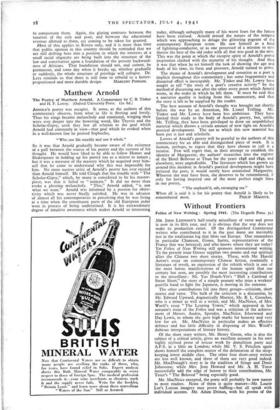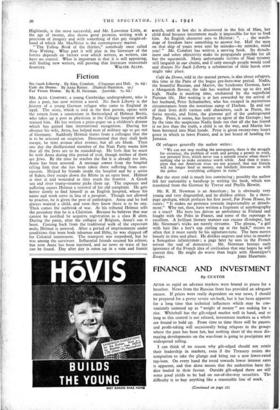Without Frontiers
Folios of New Writing : Spring 1941. (The Hogarth Press. 5s.) MR. JOHN LEHMANN'S half-yearly miscellany of verse and prose is now in its fifth year, and it is obvious that the war does not make its production easier. Of the distinguished Continental writers who contributed to it in the past many are inevitably lost in the totalitarian fog that blots out Europe. One remembers in particular Chamson, Giono, Sartre, representatives of the France that was betrayed; and who knows where they are today? Yet Folios of New Writing still sponsors international writing. To the present issue Greece supplies two poems and our spiritual
allies the Chinese two short stories. These, with Mr. Harold Acton's essay on contemporary Chinese fiction, essentially a literature of revolt, an expression of the rebirth which is one of the most heroic manifestations of the human spirit that our century has seen, are possibly the most interesting contributions to the miscellany : Mr. Yao Hsueh-Yin's " Half a Cartload of Straw Short," the story of a simple peasant who joins a workers' guerilla band to fight the Japanese, is moving in the extreme.
The other contributions fall into three groups—criticism, short stories and verse. The bulk of the criticism is a discussion, by Mr. Edward Upward, dogmatically Marxist, Mr. B. L. Coombes, who is a miner as well as a writer, and Mr. MacNeice, of Mrs. Woolf's essay " The Leaning Tower," which appeared in last
autumn's issue of the Folios and was a criticism of the achieve-
ment of Messrs. Auden, Spender, MacNeice, Isherwood and Day Lewis, to whom she gave high marks for honesty and very few for art. Mr. MacNeice in particular makes an effective defence - and has little difficulty in disposing of Mrs. Woolfs dubious interpretations of literary history.
Of the short story writers, Mr. Henry Green, who is also the subject of a critical article, gives an excellent account in his own highly stylised prose of rescue work by demolition party and A.F.S. in a blitz on London; while Mr. V. S. Pritchett again shows himself the complete master of the delineation of the shop- keeping lower middle class. The other four short-story writers are less well known, and three of them are very good indeed. Mr. MacDonagh's story is in the tradition of Synge and Denis Johnstone; while Mrs. Jean Howard and Mr. A. H. Teece successfully add the edge of horror to their contributions, Mr. Teece's " The Beloved " being especially good.
Mr. MacNeice excepted, the poets will probably be new names to most readers. None of them is quite mature—Mr. Laurie Lee's Lorcan imagery may prove baffling—but all speak with individual accents. Mr. Adam Drinan, with his poems of the
Highlands, is the most successful, and Mr. Lawrence Little, at the age of twenty, also shows great promise, writing with a precision of imagery and with something of that gay sleight-of- hand of which Mr. MacNeice is the contemporary master.
" The Yellow Book of the thirties," somebody once- called New Writing. What part it will play in the literature of the forties depends on factors over which writers, as writers, can have no control. What is important is that it is still appearing, still finding new writers, still proving that literature transcends































 Previous page
Previous page